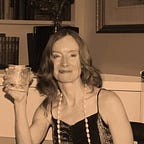My cat is going. But I still have her for now.
For I will consider my cat (after Christopher Smart).
It was dark by the time the vet phoned: “We don’t know what’s wrong,” she said. “Would you like more tests?”
It was late; all day my cat was coughing. But I asked, “What will the tests do? Will they help?”
The line fell quiet. “Well,” she said. “Maybe.”
This is the hardest part about love. My girl grows old; her kidneys, her lungs are old. They fail her. They fail me who loves her and wants her to STAY ALIVE. She isn’t sick anymore. She has conditions.
When I am sad, I read poetry, so this is what I am doing.
I am reading Jubilate Agno, Christopher Smart’s weird and wandering poem, written in a madhouse.
The section everyone knows is the one about his cat, “For I will consider my cat Jeoffry [fragment B]”. But Smart’s poem is longer than you know, and happier.
Rejoice, Smart tells us in fragment A.
Rejoice with God, with all forms of life, down to the smallest insect (“Let Ramah rejoice with the Cochineal.”). Rejoice with everything, right down to the tiniest of treasures (“Let Dew, House of Dew rejoice with Xanthenes, a precious stone of an amber colour.”)
I think about this rejoicing as I leave the book for a few minutes. It’s Sunday, and I am making my weekly muffins. It’s a pleasant task, everydayish and comfortable.
The bananas are more yellow than amber as I peel off the skins. When they are mashed, I pour in the rest of the ingredients (no separating wet and dry for me!), and they all sit together in the bowl, not amber, really, but similarly coloured, in the same family of hues: creamy chickpea flour, oats, dark sugar, egg.
Then the muffins are in the oven, and my cat is padding across the hardwood towards me.
She’s aiming for my lap, and her fur next to my leggings is cream-coloured like soft flour, like oats, or like a precious stone, a topaz maybe, a quartz. Darker patches like amber, not newly polished but older, faded by age or the sun.
She hops up, and her small feet knead my leg before she spins around and settles down all comfortable. I pick up my book, and think about Smart. Legend has it that his madhouse stay was occasioned by a strange religious mania, where he fell to his knees in public and begged people to pray with him, to mix their voices with his.
For this they put him away, in a small cell, with only a cat, a bed, and six books for company. But there Smart was happy; he rejoiced.
“For I will consider my cat Jeoffry” is the best of the fragments and it is beautiful.
Jeoffry performs the smallest of cat-tasks: he eats; he “wreathes himself around,” he jumps over sticks and up onto Smart’s lap. “In his morning orison,” writes Smart, “[Jeoffry] loves the sun and the sun loves him.”
My own girl does not jump as much anymore, and I have to encourage her to eat.
Just now she is still on my lap. Her body moves, and she turns over to find another position, her fur next to me warm-coloured and soft.
I turn a page; there is the scent of muffins in the air, and the poem I am reading is pretty. This is a quiet day: I cuddle her but don’t talk, not a whisper, not a prayer.
She is going, I know; soon I will be without her.
But just now, a stream of sun comes through the window. The tiniest dust motes in the air are sparkling, a little, like old gold or amber in settings from long ago, not as bright as before but still there, still shining.
My cat moves again, curving her paws over my leg. Let us rejoice. We are together. She is alive. She is still alive. The sun pours its treasures down at our feet.
